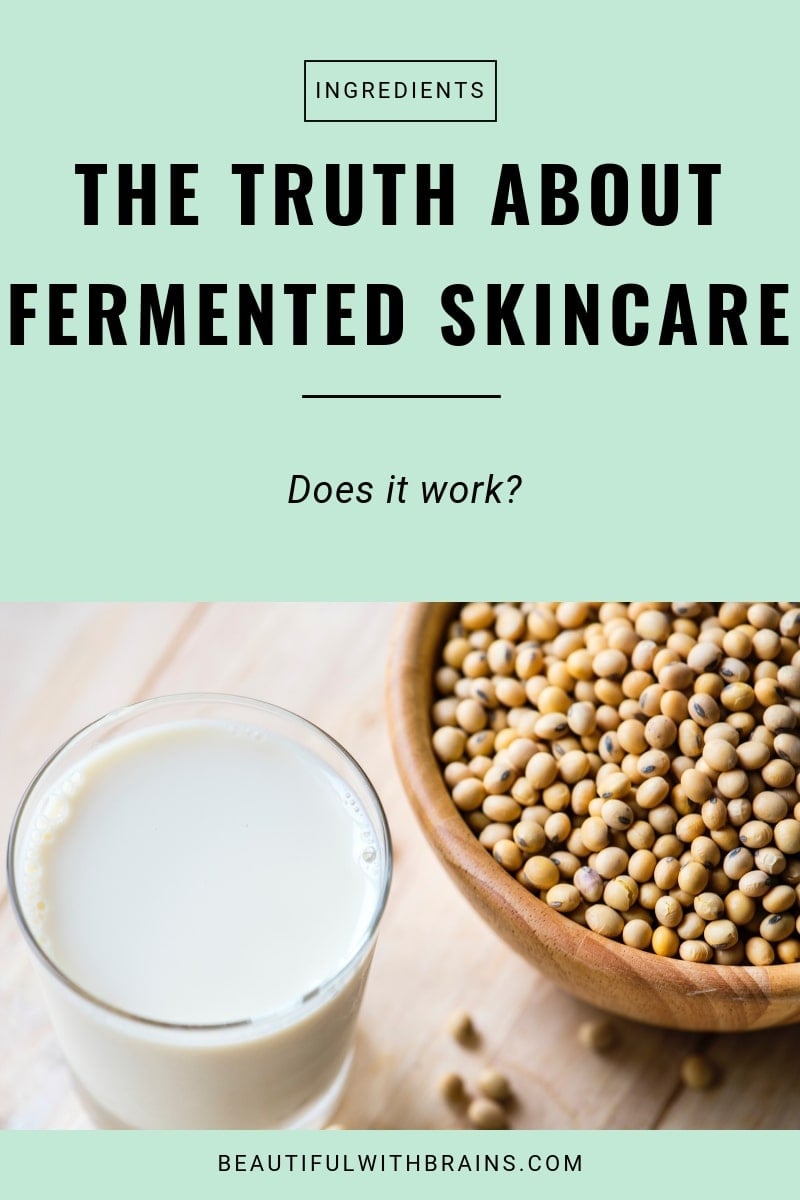
Have you been eating your bacteria lately?
I try to sneak a bottle of kefir or a pot of Greek yogurt into my diet every day. I feel SO much better since I’ve started doing it. Now my mood is lighter. That inner critic in my head doesn’t show up as often. And my skin has fewer blemishes.
Talking about skin, have you noticed how many fermented ingredients are popping up at Sephora lately? A trend started in South Korea (where else?), fermented skincare promises to be the next best thing in skincare.
Is letting your skincare ingredients marinate a little longer a good idea or is fermented skincare just a gimmick? Here’s what the science says:
What’s Fermentation?
Fermentation is a metabolic process that uses microorganisms like yeast to convert sugars into other substances. Wine is the perfect example. The yeast feeds on the sugar in grapes and releases alcohol, which helps preserve the wine.
I’m a teetotaller so no wine for me. But I get my fix of good bacteria from other fermented foods such as kefir, kombucha, kimchi, sauerkraut and vinegar.
Fermentation doesn’t just give us delicious foods. It has plenty of health benefits as well:
- It increases the availability of nutrients in these foods
- It improves your gut health (which also helps you fight depression and blemishes)
- It helps fight cancer
Fermented foods are great for your health. But is fermented skincare just as great for your skin? Mmm…
Struggling to put together a skincare routine that minimises wrinkles, prevents premature aging, and gives your complexion a youthful glow? Download your FREE “Best Anti-Aging Skincare Routine” to get started (it features product recommendations + right application order):
Does Fermented Skincare Work?
This is a tricky question to answer. Skincare brands that use fermented ingredients claim they have two main benefits:
- It breaks down ingredients into a smaller size so they can more easily penetrate skin
- It produces minerals and nutrients that are good for the skin, like Alpha Hydroxy Acids
Let’s start with point one. A lot of ingredients are too large to penetrate skin. If you make them smaller, they can get in. But, if you make them too small, they lose all their good properties and stop working altogether.
That’s what makes this question so tricky to answer. Whether a fermented ingredient will do wonders for your skin depends on how small it’s become and what nutrients it releases.
Usually, that’s Alpha Hydroxy Acids, a family of exfoliants that makes your skin softer and brighter. Some AHAs can also boost collagen production, keeping skin firm.
Question is: why go through all the trouble of fermenting skincare ingredients when you can just add AHAs to your lotions and potions?
Related: AHAs: What The Are And What Do They Do For Your Skin?
What Fermented Ingredients Really Work?
I’m not saying don’t splurge on fermented skincare. I’m saying it’s a minefield.
Just like some brands use Vitamin C properly (a big dose paired with Vitamin E and ferulic acid in an opaque, air-tight bottle), others just add a drop to entice you to buy their average products. Some fermented ingredients are amazing for your skin but others may just as well be snake oil.
You can’t just pick a bottle of fermented skincare off the shelf and think it’ll do wonders for you. You need to know what fermented ingredient it contains and how well they work. Too much work, isn’t it?
No worries, I’m here to do all the hard work for you. Atm, there are two fermented ingredients that science say work really well:
- Red ginseng: Studies show it works better at fighting wrinkles and reducing dark spots than regular red ginseng. It’s less irritating, too.
- Soy: Fermented soy can boost the production of hyaluronic acid, which leads to plumper, softer and firmer skin.
If that fermented skincare product you’re eyeing has red ginseng or soy, it may be worth the splurge.
The Bottom Line
Fermented skincare will probably be the best next thing in skincare in a few years. For now, there are only a handful of fermented ingredients proven to work. Spend your money wisely.
